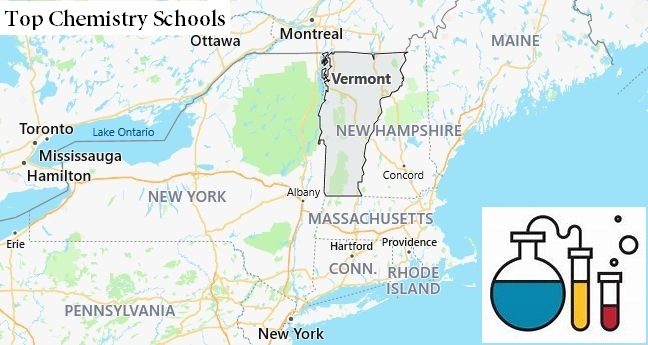If you are going to pursue a graduate degree in chemistry within the state of Vermont, then you have come to the right place. On this website, you will find the best chemistry schools in Vermont. Please note that these rankings are based on student reviews, graduation rates, and the academic surveys submitted by peer colleges and universities throughout Vermont.

| Ranking | Graduate Chemistry |
| 1 | University of Vermont Department of Chemistry Address: Cook Physical Science Building, Burlington, VT 05405 Phone: (802) 656-0278 E-mail: chemgrad@uvm.edu Website: http://www.uvm.edu |

History of Vermont
Long before Columbus and the beginning of the colonization of America, Indians lived on the territory of the modern state of Vermont . The first nomadic tribes were here already about eight thousand years ago, and settlements appeared about two thousand years before our era. By the time the Europeans arrived, Algonquian Indians, Abenaki and Mohicans lived on the lands of the state.
Probably the first European to visit the lands of Vermont was the Frenchman Jacques Cartier, who explored the area of the St. Lawrence River in 1535. In 1609 Vermont was explored by the famous French pioneer Samuel de Champlain. It was he who gave the name to the Green Mountains (Verts Monts) and Lake Champlain was named after him.
In 1666, to protect the coast of Lake Champlain from hostile Iroquois tribes, the French built the first European settlement in Vermont, Fort St. Anne, on La Motte Island. In 1690, Dutch and English settlers from neighboring New York established a trading post near the present-day city of Addison. These settlements were soon abandoned and there was no permanent European population on the lands of Vermont for a long time, although skirmishes between the British and the French were not uncommon. In 1724, during a war between New England colonists and the Abenaki Indians who supported the French, Fort Dummer was built in the area of the modern city of Brattleboro in southeastern Vermont, becoming the first permanent European settlement in the state.
In 1763, after the victory in the French and Indian War, the British established complete control over the territory of Vermont. Three American provinces claimed the new lands: New Hampshire, New York, and Massachusetts. New Hampshire Governor Wentworth Benning distributed one hundred and thirty-five pieces of land in Vermont from 1749 to 1764, many of which were located west of the Green Mountains, in fact, not far from Albany. It was thanks to these “land grants from New Hampshire” that settlers reached Vermont, and many new settlements were founded at the same time.
